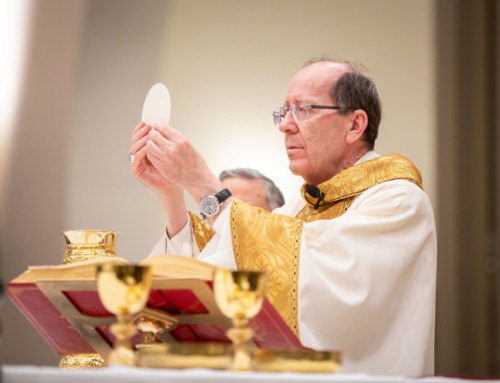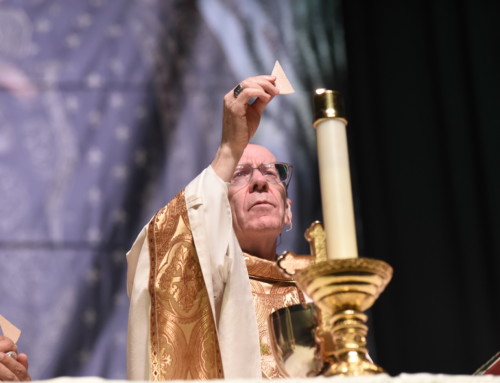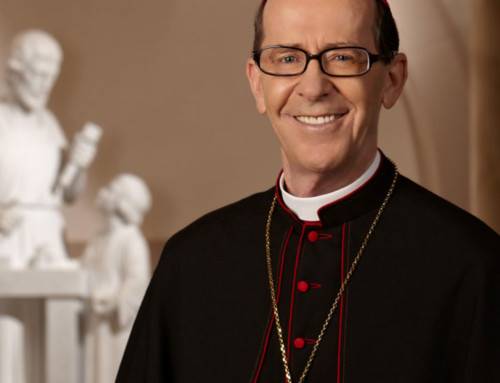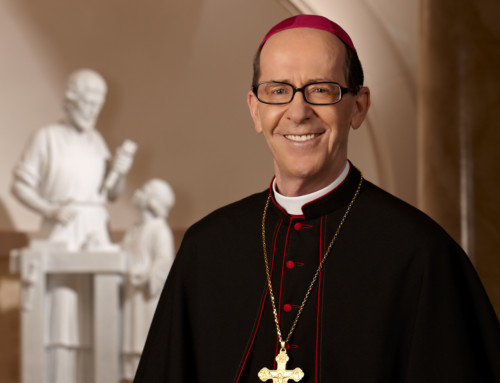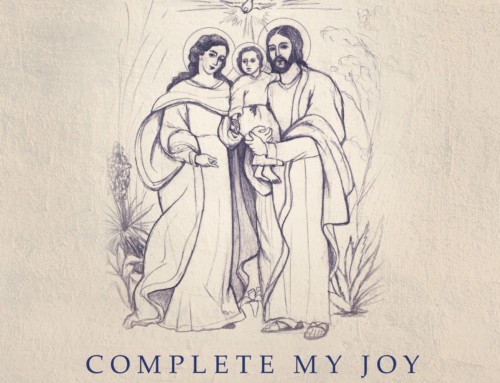A Pastoral Statement of the Arizona Catholic Conference Bishops
A growing movement in our country, bolstered by recent legal decisions in some states as well as from government actions taken in several other countries, favors making same-sex unions the legal equivalent of marriage. In response to this movement, we believe Catholics and all citizens must reflect deeply on the meaning of marriage itself. We must ask important questions: What is marriage, its purposes, and its value to individuals, families and society? As the issues surrounding same-sex unions take on increasing prominence here in Arizona, we feel such reflection, using both reason and faith, is a proper beginning point and framework for the current debate.
Pope John Paul II described the contemporary situation well when he proclaimed
“
[a]t a moment in history in which the family is the object of numerous forces that seek to destroy it, or in some way to deform it, and aware that the well-being of society and her good are intimately tied to the good of the family, the Church perceives in a more urgent and compelling way her mission of proclaiming to all people the plan of God for marriage and the family, insuring their full vitality and human and Christian development, and thus, contributing to the renewal of society and the people of God.” (John Paul II, Familiaris Consortio #3)
We, the Catholic Bishops of Arizona, are deeply concerned for our Catholic believers and the well being of society here in Arizona regarding the meaning of marriage. We offer this document to assist in understanding Catholic teaching about marriage and to make clear why we pro- mote marriage as a sacred reality between man and woman.
What is Marriage?
Marriage, as designed by God, is a faithful, exclusive, lifelong union of a man and a woman joined in an intimate community of life and love. They commit themselves completely to each other and to the wondrous responsibility of bringing children into the world and caring for them. Man and woman are equal; they are also different. It is this difference that points marvelously toward their complementarity. Man and woman, in their sexual difference, are made for each other. This complementarity draws them together in a mutually loving union that should always be open to the procreation of children. (Catechism of the Catholic Church #1602-1605)
Far from being a “merely” religious matter, these truths about marriage are found in the order of nature and can be perceived by human reason. The culture a person lives in can powerfully affect perception. Unfortunately, our own culture is more and more confused on matters of sexuality, and the truth of marriage suffers from the same blurry thinking.
Marriage and Catholic Faith
Sacred Scripture and the teaching of the Church confirm these truths about marriage and deepen them. Genesis 1:27 shows us that the human person’s complementarity as male and female reflects the image of God. A man “leaves his father and mother and clings to his wife, and the two of them become one flesh” (Gn 2:23). The man joyfully recognizes the woman as “bone of my bone and flesh of my flesh” (Gn 2:23). God blesses the man and woman and commands them to “be fertile and multiply” (Gn 1:28). Jesus echoes these teachings from Genesis when he stated: “…from the beginning the Creator ‘made them male and female’ and said, ‘[f ]or this reason a man shall leave … and the two shall become one flesh” (Matt. 19: 4,5).
These Biblical passages help us to under- stand God’s plan for marriage. Man and woman enter a lifelong bond of love and life, giving themselves as equal persons completely to one another. By this self-gift, they cooperate with God in bringing children to life and in caring for them.
Moreover, the Church, following the Apostle Paul, declares a valid marriage between baptized believers to be a sacrament — a saving reality and path to holiness. In Ephesians 5: 25-33, Paul teaches that Christ made marriage a sign of His love for the Church. This means that a sacramental marriage lets the world see, in human terms, something of the faithful, creative, self-emptying, abundantly life-giving love of our Lord. This Christian meaning confirms and strengthens the human value of a marital union.
Why Can Marriage Exist Only Between a Man and a Woman?
In marriage, husband and wife give themselves totally to each other in their masculinity and femininity, and only such a sexual union can cooperate with God in the procreation of new human life. Only such a union fulfills God’s plan both for sexuality and for marriage itself. The permanent and exclusive commitment of marriage is the necessary context for the expression of sexual love intended by God both to serve the transmission of human life and to build the bond between husband and wife. So- called “same-sex unions” lack both natural complementarity and the ability to generate new human life naturally. They have a different meaning entirely.
Societally, the implications of equating so-called “same-sex unions” and marriage are profound and unsettling. Across times, cultures, and very different religious beliefs, marriage is the foundation of the family. The family, in turn, is the basic unit of society. This makes marriage a personal relationship with enormous public significance.
Marriage contributes to society because it models the way women and men live interdependently and commit, for life, to seek the best for each other. Additionally, the marital union provides the best conditions for raising children: namely, the stable, loving relationship of a mother and father present only in marriage. The state rightly recognizes this relationship as a public institution in its laws because the relationship makes a unique and essential contribution to the common good.
Regarding the Proposed Protect Marriage Arizona Amendment
Protect Marriage Arizona is an initiative to amend the Arizona Constitution that we feel seeks to preserve the unique and irreplaceable status that marriage always has held in our society.
It is in the context of Catholic teaching on marriage that we choose at this time to state our support for the amendment.
Clearly, among the issues that have surrounded the legal actions regarding marriage in other states has been the legal recognition of same-sex unions. The Church opposes legal recognition of such unions in order to prevent the redefinition and de-evaluation of the institution of marriage. (Congregation for the Doctrine of the Faith, Considerations Regarding Proposals To Give Legal Recognition To Unions Between Homosexual Persons #11)
At the same time, we reiterate the Church’s teaching that people of what- ever orientation must always be treated with compassion and respect and that their civil liberties must be protected. The Catechism of the Catholic Church further elaborates in reference to people of homosexual orientation that “[e]very sign of unjust discrimination in this regard should be avoided.” (Catechism of the Catholic Church #2358)
In supporting Protect Marriage Arizona, we urge citizens of Arizona to consider carefully the assurance the amendment would give in our State to preserve the definition of marriage as between one man and one woman.
It should be noted that the initiative permits the creation of “reciprocal benefits” whereby employees are able to select any other household member to receive benefits in addition to themselves. The creation of such a benefits program is positive for all people. Many elderly family members living with relatives could also find this beneficial.
At the present time 183,917 valid signatures are necessary to qualify the initiative for the ballot. If signatures are collected and are valid, Arizona voters will then make the final decision.
There are no legal restrictions to collecting signatures for such an initiative on church grounds, and some parishes have already begun such efforts. Nonetheless, such activities may present issues for some in the Catholic community. Since churches, parish offices and other church property are primarily for worship, those seeking signatures on church grounds should seek permission from the pastor prior to collecting signatures on church property itself.



